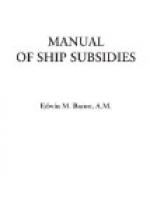The total Austria-Hungary tonnage in 1910-11 was recorded at 779,029 tons.[DO]
FOOTNOTES:
[Footnote DD: Meeker.]
[Footnote DE: U.S. Con. Rept., Jan., 1890, no. 112, p. 95-96.]
[Footnote DF: U.S. Con. Repts., vol. XXXII, 1890, no. 112, pp. 23-24.]
[Footnote DG: Meeker.]
[Footnote DH: U.S. Con. Rept., no. 282, March, 1904, pp. 645-646.]
[Footnote DI: Meeker.]
[Footnote DJ: U.S. Con. Rept., no. 320, July, 1907, p. 180.]
[Footnote DK: Meeker.]
[Footnote DL: Meeker. Also Parl. papers, Com., 1909, no. 4, p. 8.]
[Footnote DM: U.S. Con. Rept., no. 283, April, 1904, p. 304.]
[Footnote DN: U.S. Con. Rept., no. 352, Jan., 1910, p. 45.]
[Footnote DO: Lloyd’s Register, 1910-11.]
CHAPTER VII
ITALY
Early after its establishment in 1861 the Kingdom of Italy adopted a subsidy system with the object of reviving and upbuilding the then languishing Italian merchant marine. This policy was instituted in 1866 with the grant of premiums on the construction of wooden ships. At the same time materials used in the construction, repair, or enlargement of ships were made duty-free.[DP]
For a while under these conditions, before iron ships had come much into use, the merchant marine prospered. Then it again began to languish; and in 1881 the promulgation of the French general bounty law was made the special occasion for considering the adoption of a similar measure.[DQ] The draft of a bill modelled after that law was promptly introduced in the Chamber of Deputies, in February. But with its consideration such perplexities arose that at length the whole subject was referred to a commission of inquiry, to investigate and report a more satisfactory one. The result of this inquiry was a bill which became law December 6, 1885, to continue in force for ten years.
This law provided for general construction subsidies, on the following scale: for steamers and sailing-ships built of iron or steel, sixty lire ($11.58) per gross ton; for steam or sailing ships built of wood, fifteen lire; for galleggianti (floating material: the term signifying merchant ships navigating the Italian seaboard, rivers, and lakes, but not provided with certificates of nationality), of iron or steel, thirty lire; for construction and repairs of marine engines, ten lire per quintal; for marine boilers, six lire per hundred kilograms of weight. These bounties were to be increased from 10 to 20 per cent (according to the degree of speed and other desirable qualities shown) for steamers built on plans approved by the Government engineers as to be convertible into cruisers, showing a speed of not less than fourteen knots an hour, and with sufficient coal-carrying space to steam four thousand miles at ten knots. The law was applicable to ships bought abroad as well as those of domestic build. But it forbade the sale or charter to a foreigner of any steamer upon which the bounty had been paid, except by Government permission. The laws of 1866 granting premiums and free entry to shipbuilding materials were suspended during the ten years’ term of this act.[DR]




